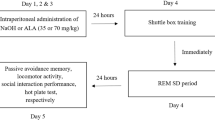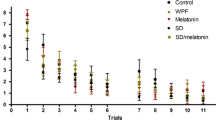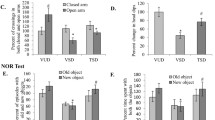Abstract
Sleep is involved in maintaining energy, regulating heat, and recovering tissues. Furthermore, proper cognitive functions need sufficient sleep. Many studies have revealed the impairment effect of sleep deprivation (SD) on cognitive functions including learning and memory. Alpha lipoic acid (ALA) is a potent free radical scavenger, biological antioxidant, and neuroprotective agent. Furthermore, ALA improves learning and memory performance, decreases oxidative stress, and enhances antioxidant biomarkers. In this study, we aimed to investigate the effect of ALA on social interaction and passive avoidance memories in sleep-deprived rats. Total sleep deprivation (TSD) apparatus was used to induce SD (for 24 h). Three-chamber paradigm test and shuttle box apparatus were used to evaluate social interaction and passive avoidance memory, respectively. Rats’ locomotor apparatus was used to assess locomotion. ALA was administered intraperitoneally at doses of 17 and 35 mg/kg for 3 consecutive days. The results showed SD impaired both types of memories. ALA at the dose of 35 mg/kg restored social interaction memory in sleep-deprived rats; while, at the dose of 17 mg/kg attenuated impairment effect of SD. Moreover, ALA at the dose of 35 mg/kg impaired passive avoidance memory in sham-SD rats and at both doses did not rescue passive avoidance memory in sleep-deprived rats. In conclusion, ALA showed impairment effect on passive avoidance memory, while improved social interaction memory in sleep-deprived rats.





Similar content being viewed by others
References
Abel T, Havekes R, Saletin JM, Walker MP (2013) Sleep, plasticity and memory from molecules to whole-brain networks. Curr Biol 23:R774–R788
Ahmad L, Mujahid M, Mishra A, Rahman MA (2019). Protective role of hydroalcoholic extract of Cajanus cajan Linn leaves against memory impairment in sleep deprived experimental rats. J Ayurveda Integr Med
Aldabal L, Bahammam AS (2011) Metabolic, endocrine, and immune consequences of sleep deprivation. Open Respir Med J 5:31–43
Alhaider IA, Aleisa AM, Tran TT, Alkadhi KA (2010) Caffeine prevents sleep loss-induced deficits in long-term potentiation and related signaling molecules in the dentate gyrus. Eur J Neurosci 31:1368–1376
Alhaider IA, Aleisa AM, Tran TT, Alkadhi KA (2011) Sleep deprivation prevents stimulation-induced increases of levels of P-CREB and BDNF: protection by caffeine. Mol Cell Neurosci 46:742–751
Alzoubi KH, Malkawi BS, Khabour OF, El-Elimat T, Alali FQ (2018) Arbutus andrachne L. reverses sleep deprivation-induced memory impairments in rats. Mol Neurobiol 55:1150–1156
Alzoubi KH, Mayyas F, Abu Zamzam HI (2019) Omega-3 fatty acids protects against chronic sleep-deprivation induced memory impairment. Life Sci 227:1–7
Andreeva-Gateva P, Traikov L, Sabit Z, Bakalov D, Tafradjiiska-Hadjiolova R (2020) Antioxidant effect of alpha-lipoic acid in 6-Hydroxydopamine unilateral intrastriatal injected rats. Antioxidants (Basel) 9
Antunes M, Biala G (2012) The novel object recognition memory: neurobiology, test procedure, and its modifications. Cogn Process 13:93–110
Castro MC, Francini F, Gagliardino JJ, Massa ML (2014) Lipoic acid prevents fructose-induced changes in liver carbohydrate metabolism: role of oxidative stress. Biochim Biophys Acta 1840:1145–1151
Chaudhary P, Marracci G, Yu X, Galipeau D, Morris B, Bourdette D (2011) Lipoic acid decreases inflammation and confers neuroprotection in experimental autoimmune optic neuritis. J Neuroimmunol 233:90–96
Chng HT, New LS, Neo AH, Goh CW, Browne ER, Chan EC (2009) Distribution study of orally administered lipoic acid in rat brain tissues. Brain Res 1251:80–86
Connell BJ, Saleh M, Khan BV, Saleh TM (2011) Lipoic acid protects against reperfusion injury in the early stages of cerebral ischemia. Brain Res 1375:128–136
D'Almeida V, Hipolide DC, Lobo LL, de Oliveira AC, Nobrega JN, Tufik S (2000) Melatonin treatment does not prevent decreases in brain glutathione levels induced by sleep deprivation. Eur J Pharmacol 390:299–302
Daenen EW, Wolterink G, Gerrits MA, Van Ree JM (2002) The effects of neonatal lesions in the amygdala or ventral hippocampus on social behaviour later in life. Behav Brain Res 136:571–582
de Sousa CNS, Meneses LN, Vasconcelos GS, da Silva MI, Silva MCC, Mouaffak F, Kebir O, da Silva Leite CMG, Patrocinio MCA, Macedo D, Vasconcelos SMM (2018) Neuroprotective evidence of alpha-lipoic acid and desvenlafaxine on memory deficit in a neuroendocrine model of depression. Naunyn Schmiedeberg's Arch Pharmacol 391:803–817
Delaney AJ, Sedlak PL, Autuori E, Power JM, Sah P (2013) Synaptic NMDA receptors in basolateral amygdala principal neurons are triheteromeric proteins: physiological role of GluN2B subunits. J Neurophysiol 109:1391–1402
Dixit S, Mehra RD, Dhar P (2020) Effect of alpha-lipoic acid on spatial memory and structural integrity of developing hippocampal neurons in rats subjected to sodium arsenite exposure. Environ Toxicol Pharmacol 75:103323
Ersahin M, Toklu HZ, Cetinel S, Yuksel M, Erzik C, Berkman MZ, Yegen BC, Sener G (2010) Alpha lipoic acid alleviates oxidative stress and preserves blood brain permeability in rats with subarachnoid hemorrhage. Neurochem Res 35:418–428
Farr SA, Price TO, Banks WA, Ercal N, Morley JE (2012) Effect of alpha-lipoic acid on memory, oxidation, and lifespan in SAMP8 mice. J Alzheimers Dis 32:447–455
Freitas RM (2009) The evaluation of effects of lipoic acid on the lipid peroxidation, nitrite formation and antioxidant enzymes in the hippocampus of rats after pilocarpine-induced seizures. Neurosci Lett 455:140–144
Gibson EM, Wang C, Tjho S, Khattar N, Kriegsfeld LJ (2010) Experimental ‘jet lag’ inhibits adult neurogenesis and produces long-term cognitive deficits in female hamsters. PLoS One 5:e15267
Goel N, Rao H, Durmer JS, Dinges DF (2009) Neurocognitive consequences of sleep deprivation. Semin Neurol 29:320–339
Guzman-Marin R, Suntsova N, Methippara M, Greiffenstein R, Szymusiak R, McGinty D (2005) Sleep deprivation suppresses neurogenesis in the adult hippocampus of rats. Eur J Neurosci 22:2111–2116
Havekes R, Park AJ, Tudor JC, Luczak VG, Hansen RT, Ferri SL, Bruinenberg VM, Poplawski SG, Day JP, Aton SJ, Radwanska K, Meerlo P, Houslay MD, Baillie GS, Abel T (2016) Sleep deprivation causes memory deficits by negatively impacting neuronal connectivity in hippocampal area CA1. Elife 5
Havekes R, Vecsey CG, Abel T (2012) The impact of sleep deprivation on neuronal and glial signaling pathways important for memory and synaptic plasticity. Cell Signal 24:1251–1260
Holmquist L, Stuchbury G, Berbaum K, Muscat S, Young S, Hager K, Engel J, Munch G (2007) Lipoic acid as a novel treatment for Alzheimer’s disease and related dementias. Pharmacol Ther 113:154–164
Ishikawa A, Kanayama Y, Matsumura H, Tsuchimochi H, Ishida Y, Nakamura S (2006) Selective rapid eye movement sleep deprivation impairs the maintenance of long-term potentiation in the rat hippocampus. Eur J Neurosci 24:243–248
Javad-Moosavi BZ, Vaezi G, Nasehi M, Haeri-Rouhani SA, Zarrindast MR (2017) Critical role of CA1 muscarinic receptors on memory acquisition deficit induced by total (TSD) and REM sleep deprivation (RSD). Prog Neuro-Psychopharmacol Biol Psychiatry 79:128–135
Jiang F, Shen XM, Li SH, Cui ML, Zhang Y, Wang C, Yu XG, Yan CH (2009) Effects of chronic partial sleep deprivation on growth and learning/memory in young rats. Zhongguo Dang Dai Er Ke Za Zhi 11:128–132
Kaidanovich-Beilin O, Lipina T, Vukobradovic I, Roder J, Woodgett JR (2011) Assessment of social interaction behaviors. JoVE (Journal of Visualized Experiments):e2473
LaLumiere RT, Pizano E, McGaugh JL (2004) Intra-basolateral amygdala infusions of AP-5 impair or enhance retention of inhibitory avoidance depending on training conditions. Neurobiol Learn Mem 81:60–66
Li Z, Richter-Levin G (2013) Priming stimulation of basal but not lateral amygdala affects long-term potentiation in the rat dentate gyrus in vivo. Neuroscience 246:13–21
Lopez-Virgen V, Zarate-Lopez D, Adirsch FL, Collas-Aguilar J, Gonzalez-Perez O (2015) Effects of sleep deprivation in hippocampal neurogenesis. Gac Med Mex 151:99–104
Magistretti PJ (2011) Neuron-glia metabolic coupling and plasticity. Exp Physiol 96:407–410
Mahboob A, Farhat SM, Iqbal G, Babar MM, Zaidi NU, Nabavi SM, Ahmed T (2016) Alpha-lipoic acid-mediated activation of muscarinic receptors improves hippocampus- and amygdala-dependent memory. Brain Res Bull 122:19–28
Maquet P (2001) The role of sleep in learning and memory. Science 294:1048–1052
Mayr JA, Feichtinger RG, Tort F, Ribes A, Sperl W (2014) Lipoic acid biosynthesis defects. J Inherit Metab Dis 37:553–563
McGaugh JL, Cahill L, Roozendaal B (1996) Involvement of the amygdala in memory storage: interaction with other brain systems. Proc Natl Acad Sci U S A 93:13508–13514
McIntyre CK, Power AE, Roozendaal B, McGaugh JL (2003) Role of the basolateral amygdala in memory consolidation. Ann N Y Acad Sci 985:273–293
Meerlo P, Mistlberger RE, Jacobs BL, Heller HC, McGinty D (2009) New neurons in the adult brain: the role of sleep and consequences of sleep loss. Sleep Med Rev 13:187–194
Montagrin A, Saiote C, Schiller D (2018) The social hippocampus. Hippocampus 28:672–679
Murata Y, Oka A, Iseki A, Mori M, Ohe K, Mine K, Enjoji M (2018) Prolonged sleep deprivation decreases cell proliferation and immature newborn neurons in both dorsal and ventral hippocampus of male rats. Neurosci Res 131:45–51
Namvarpour Z, Nasehi M, Amini A, Zarrindast MR (2018) Protective role of alpha-lipoic acid in impairments of social and stereotyped behaviors induced by early postnatal administration of thimerosal in male rat. Neurotoxicol Teratol 67:1–9
Nasehi M, Tabatabaie M, Khakpai F, Zarrindast MR (2015) The effects of CA1 5HT4 receptors in MK801-induced amnesia and hyperlocomotion. Neurosci Lett 587:73–78
Nebbioso M, Pranno F, Pescosolido N (2013) Lipoic acid in animal models and clinical use in diabetic retinopathy. Expert Opin Pharmacother 14:1829–1838
Noguti J, Andersen ML, Cirelli C, Ribeiro DA (2013) Oxidative stress, cancer, and sleep deprivation: is there a logical link in this association? Sleep Breath 17:905–910
Norozpour Y, Nasehi M, Sabouri-Khanghah V, Torabi-Nami M, Zarrindast MR (2016) The effect of CA1 alpha2 adrenergic receptors on memory retention deficit induced by total sleep deprivation and the reversal of circadian rhythm in a rat model. Neurobiol Learn Mem 133:53–60
Oliveira SLB, Oliveira MGM, Hipolide DC (2019) A1 adenosine receptors in the striatum play a role in the memory impairment caused by sleep deprivation through downregulation of the PKA pathway. Neurobiol Learn Mem 160:91–97
Packer L, Tritschler HJ, Wessel K (1997) Neuroprotection by the metabolic antioxidant alpha-lipoic acid. Free Radic Biol Med 22:359–378
Packer L, Witt EH, Tritschler HJ (1995) alpha-Lipoic acid as a biological antioxidant. Free Radic Biol Med 19:227–250
Parent MB, Tomaz C, McGaugh JL (1992) Increased training in an aversively motivated task attenuates the memory-impairing effects of posttraining N-methyl-D-aspartate-induced amygdala lesions. Behav Neurosci 106:789–797
Petersen Shay K, Moreau RF, Smith EJ, Hagen TM (2008) Is alpha-lipoic acid a scavenger of reactive oxygen species in vivo? Evidence for its initiation of stress signaling pathways that promote endogenous antioxidant capacity. IUBMB Life 60:362–367
Quinn JF, Bussiere JR, Hammond RS, Montine TJ, Henson E, Jones RE, Stackman RW Jr (2007) Chronic dietary alpha-lipoic acid reduces deficits in hippocampal memory of aged Tg2576 mice. Neurobiol Aging 28:213–225
Ravassard P, Pachoud B, Comte JC, Mejia-Perez C, Scote-Blachon C, Gay N, Claustrat B, Touret M, Luppi PH, Salin PA (2009) Paradoxical (REM) sleep deprivation causes a large and rapidly reversible decrease in long-term potentiation, synaptic transmission, glutamate receptor protein levels, and ERK/MAPK activation in the dorsal hippocampus. Sleep 32:227–240
Reljanovic M, Reichel G, Rett K, Lobisch M, Schuette K, Moller W, Tritschler HJ, Mehnert H (1999) Treatment of diabetic polyneuropathy with the antioxidant thioctic acid (alpha-lipoic acid): a two year multicenter randomized double-blind placebo-controlled trial (ALADIN II). Alpha lipoic acid in diabetic neuropathy. Free Radic Res 31:171–179
Rocamonde B, Paradells S, Barcia JM, Barcia C, Garcia Verdugo JM, Miranda M, Romero Gomez FJ, Soria JM (2012) Neuroprotection of lipoic acid treatment promotes angiogenesis and reduces the glial scar formation after brain injury. Neuroscience 224:102–115
Roozendaal B, Castello NA, Vedana G, Barsegyan A, McGaugh JL (2008) Noradrenergic activation of the basolateral amygdala modulates consolidation of object recognition memory. Neurobiol Learn Mem 90:576–579
Siedlak SL, Casadesus G, Webber KM, Pappolla MA, Atwood CS, Smith MA, Perry G (2009) Chronic antioxidant therapy reduces oxidative stress in a mouse model of Alzheimer’s disease. Free Radic Res 43:156–164
Soares JC, Fornari RV, Oliveira MG (2006) Role of muscarinic M1 receptors in inhibitory avoidance and contextual fear conditioning. Neurobiol Learn Mem 86:188–196
Somani SM, Husain K, Whitworth C, Trammell GL, Malafa M, Rybak LP (2000) Dose-dependent protection by lipoic acid against cisplatin-induced nephrotoxicity in rats: antioxidant defense system. Pharmacol Toxicol 86:234–241
Sompol P, Liu X, Baba K, Paul KN, Tosini G, Iuvone PM, Ye K (2011) N-acetylserotonin promotes hippocampal neuroprogenitor cell proliferation in sleep-deprived mice. Proc Natl Acad Sci U S A 108:8844–8849
Tang LH, Aizenman E (1993) Allosteric modulation of the NMDA receptor by dihydrolipoic and lipoic acid in rat cortical neurons in vitro. Neuron 11:857–863
Tauck DL, Ashbeck GA (1990) Glycine synergistically potentiates the enhancement of LTP induced by a sulfhydryl reducing agent. Brain Res 519:129–132
Thirunavukkarasu V, Anitha Nandhini AT, Anuradha CV (2004) Cardiac lipids and antioxidant status in high fructose rats and the effect of alpha-lipoic acid. Nutr Metab Cardiovasc Dis 14:351–357
Tomaz C, Dickinson-Anson H, McGaugh JL (1992) Basolateral amygdala lesions block diazepam-induced anterograde amnesia in an inhibitory avoidance task. Proc Natl Acad Sci U S A 89:3615–3619
Tononi G, Cirelli C (2006) Sleep function and synaptic homeostasis. Sleep Med Rev 10:49–62
Tosini G, Ye K, Iuvone PM (2012) N-acetylserotonin: neuroprotection, neurogenesis, and the sleepy brain. Neuroscientist 18:645–653
Tudor JC, Davis EJ, Peixoto L, Wimmer ME, van Tilborg E, Park AJ, Poplawski SG, Chung CW, Havekes R, Huang J, Gatti E, Pierre P, Abel T (2016) Sleep deprivation impairs memory by attenuating mTORC1-dependent protein synthesis. Sci Signal 9:ra41
Vecsey CG, Baillie GS, Jaganath D, Havekes R, Daniels A, Wimmer M, Huang T, Brown KM, Li XY, Descalzi G, Kim SS, Chen T, Shang YZ, Zhuo M, Houslay MD, Abel T (2009) Sleep deprivation impairs cAMP signalling in the hippocampus. Nature 461:1122–1125
Wadhwa M, Prabhakar A, Anand JP, Ray K, Prasad D, Kumar B, Panjwani U (2019) Complement activation sustains neuroinflammation and deteriorates adult neurogenesis and spatial memory impairment in rat hippocampus following sleep deprivation. Brain Behav Immun 82:129–144
Wagner U, Born J (2008) Memory consolidation during sleep: interactive effects of sleep stages and HPA regulation. Stress 11:28–41
Woodward JJ, Blair R (1991) Redox modulation of N-methyl-D-aspartate-stimulated neurotransmitter release from rat brain slices. J Neurochem 57:2059–2064
Yang SQ, Jiang L, Lan F, Wei HJ, Xie M, Zou W, Zhang P, Wang CY, Xie YR, Tang XQ (2019) Inhibited endogenous H2S generation and excessive autophagy in hippocampus contribute to sleep deprivation-induced cognitive impairment. Front Psychol 10:53
Zaitone SA, Abo-Elmatty DM, Shaalan AA (2012) Acetyl-L-carnitine and alpha-lipoic acid affect rotenone-induced damage in nigral dopaminergic neurons of rat brain, implication for Parkinson’s disease therapy. Pharmacol Biochem Behav 100:347–360
Zhang Y, Lv YL, Si YN, Zhou J, Qian Y, Bao HG (2019) Alpha-lipoic acid attenuates spatial learning and memory impairment induced by hepatectomy. Exp Ther Med 17:2329–2333
Zhao RR, Xu F, Xu XC, Tan GJ, Liu LM, Wu N, Zhang WZ, Liu JX (2015) Effects of alpha-lipoic acid on spatial learning and memory, oxidative stress, and central cholinergic system in a rat model of vascular dementia. Neurosci Lett 587:113–119
Author information
Authors and Affiliations
Contributions
M. Rezaie and MH. Mohammadi-Mahdiabadi-Hasani collected animal data. S. Vaseghi and M. Nasehi wrote and edited the manuscript and analyzed data. MR. Zarrindast and MA. Nasiri-Khalili designed the study. All the authors have approved the final manuscript. All data were generated in-house and that no paper mill was used.
Corresponding author
Ethics declarations
Conflict of interest
The authors declare that they have no conflict of interest.
Additional information
Publisher’s note
Springer Nature remains neutral with regard to jurisdictional claims in published maps and institutional affiliations.
Rights and permissions
About this article
Cite this article
Rezaie, M., Nasehi, M., Vaseghi, S. et al. The protective effect of alpha lipoic acid (ALA) on social interaction memory, but not passive avoidance in sleep-deprived rats. Naunyn-Schmiedeberg's Arch Pharmacol 393, 2081–2091 (2020). https://doi.org/10.1007/s00210-020-01916-z
Received:
Accepted:
Published:
Issue Date:
DOI: https://doi.org/10.1007/s00210-020-01916-z




